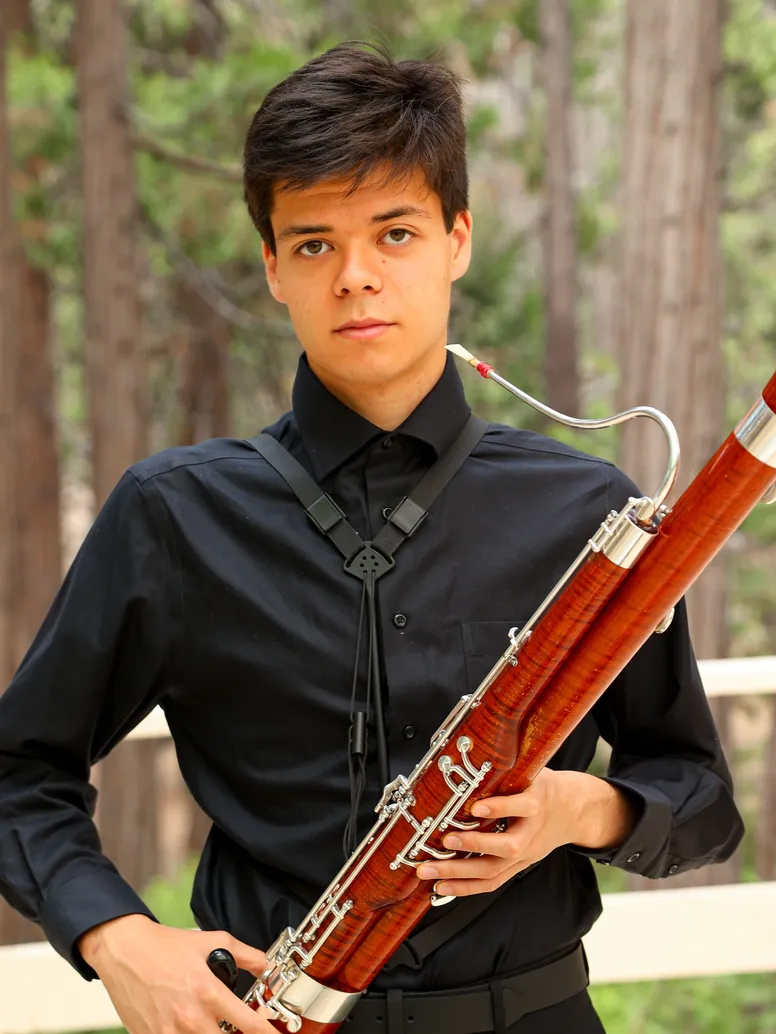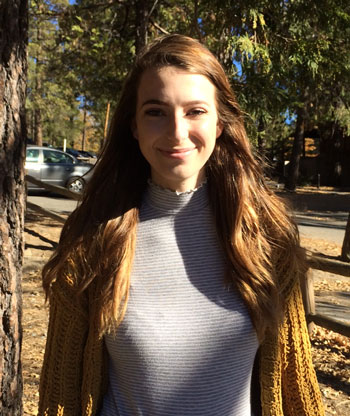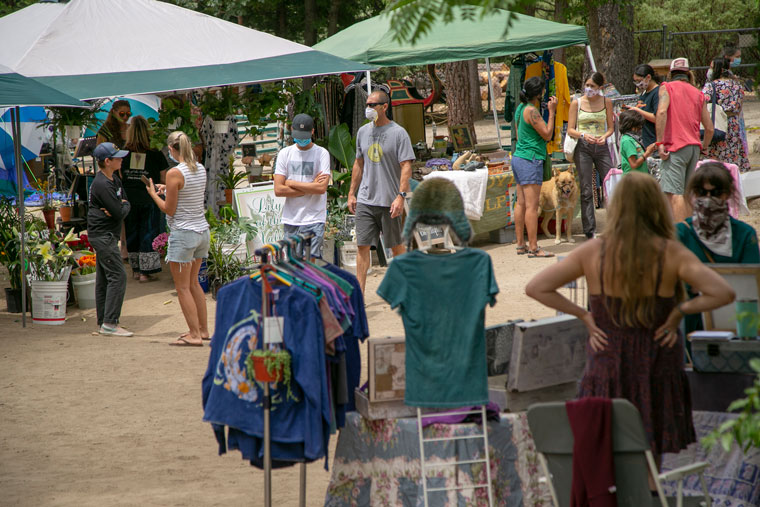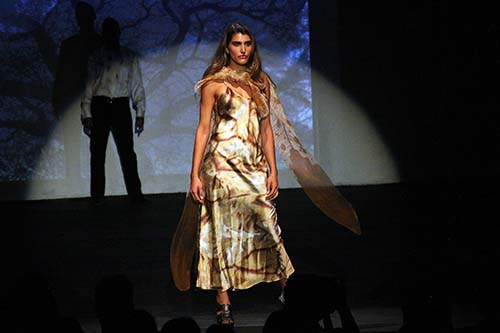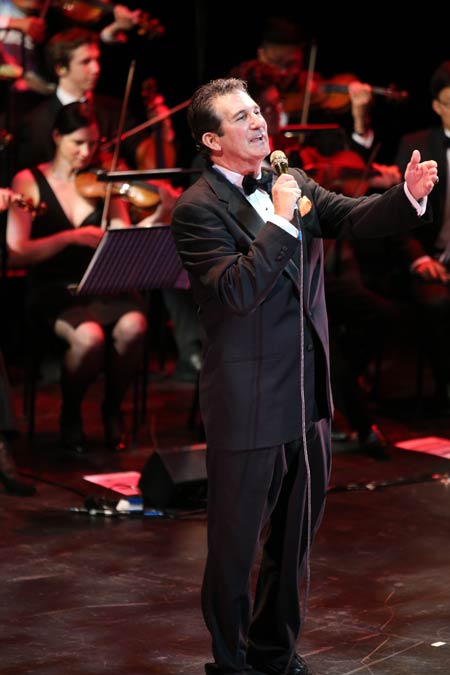Preston Atkins, 16, a senior bassoonist at Idyllwild Arts Academy (IAA) who hails from Cedar Falls, Iowa, is preparing for a number of concerto competitions. His bassoon teacher, Martin Kuuskmann, is professor of bassoon at the University of Denver Lamont School of Music, making the trek to Idyllwild once a month to work with IAA’s double-reed students. Kuuskmann said Preston is “one of the most talented students I’ve had. I’m a very active performer; I’ve heard students from all across the world, juried auditions for youth orchestras in Europe and given master classes all across the world, from China to Australia. It’s a chance that you land on a student [who] is able to do what you envision in the music … someone who at 16 is able to do it, on the bassoon [which] is a demanding instrument.
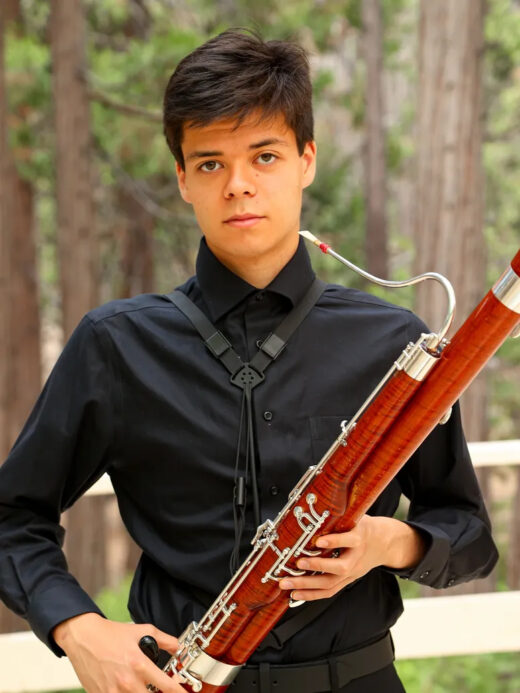
PHOTO COURTESY OF IAA
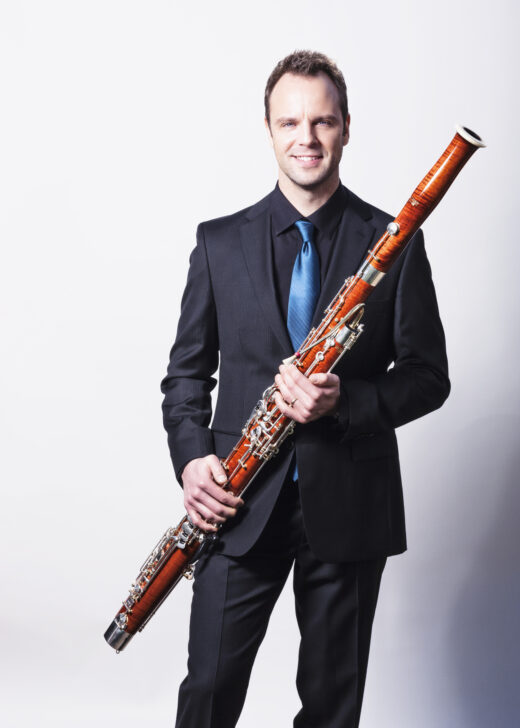
PHOTO COURTESY OF MARTIN KUUSKMANN
“It’s not that everything comes easy to him, but when it comes to playing and performing, he loves the stage. He is a shy person, withheld, but he’s very intelligent; he writes extremely well. He’s got a real maturity about him when he expresses himself in words and the same thing when he expresses himself in music; he’s constantly creating. We as teachers are lucky to have a handful of students like this in a lifetime.”
This coming weekend, Preston will perform in a concerto competition in Wisconsin, and has quite a summer lined up, including a European tour with the nation’s top youth orchestra.
TC: “You began on piano?”
PA: “Yes, I began my musical studies at the age of 4 on piano when I was living in Oklahoma. I also picked up violin soon after, in addition to oboe (which later turned into bassoon). I am truly so grateful to have started music at such an early age, especially with piano, as the intuition and skills that I have developed from these studies have allowed me a very big step up from many bassoonists in my age group. In fact, when I started bassoon, I did not practice much as it was so easy for me to read bassoon music, as just one note can be played at once. Meanwhile, in piano music, it is not at all uncommon to have passages with up to four independent voices to sort through. I began private lessons a few months after I started bassoon under a retired band director, Ms. Diane Blake, who brought me so far at the beginning of my studies. Before coming to IAA I always played the organ and held several jobs in my community in churches and accompaniment services.”
TC: “Any other things you like to say about your early musical experiences and Cedar Falls?”
PA: “Although Iowa is not necessarily a bad place to live, my classical music interests really suffered by staying in Iowa. When compared to Europe or the East Coast, I would say that there just seems to be a general lack of interest and support for the arts in many parts of the Midwest. Certainly, I was not always dedicated to music and practice thereof. Regardless, the scope of opportunities that were available to me was very inadequate. My first performance on bassoon actually happened just this past summer when I was outside of Iowa at a summer music program. My former high school was also very unsupportive of my aspirations, as I was excluded from taking a basic music theory class on the basis of my age, despite my extensive background.”
TC: “What led to your coming to Idyllwild Arts?”
PA: “In short, because of my bassoon teacher Prof. Martin Kuuskmann. The story of how I came to meet him is really quite interesting. My piano teacher of nearly a decade, Dr. Suzanne Torkelson, teaches at Wartburg College [Waverly, Iowa] and also teaches at Denver University’s Lamont School of Music during the summers. She recommended me to attend the program, mainly for piano, although she mentioned my bassoon skills would be very attractive for scholarships. I was ultimately not able to go as a result of the pandemic, but I reached out to Prof. Kuuskmann who was the bassoon teacher and started lessons under him soon after … which has led to a whole host of opportunities. I actually came to Idyllwild alongside my teacher, as he just started teaching at IAA this past summer. At this time, I believe that I was his only pre-college student, so it made a lot of sense for me to go and ‘escape’ Iowa to have a better chance of pursuing my dreams.”
TC: “Martin tells me you could have continued as a pianist but chose the bassoon … or did it choose you?”
PA: “Even to this day I would say that I view myself more as a pianist than a bassoonist. I really do love piano, and I would say that my piano skills are easily on the same level as my bassoon skills. There are a number of reasons that I have decided to prioritize bassoon over piano starting about a year ago. Classical piano is an incredibly competitive world, and to be one of the ‘bests’ nowadays, in most cases, entails being a child prodigy and having the opportunities/resources of a major cultural center in order to showcase your talent. There are just so many extremely gifted pianists in the world all competing against one another, and at the end of the day, I suppose that I just felt much better about my chances of being one of the ‘bests’ in a much smaller, bassoon, world. If nothing else, being able to study under Professor Kuuskmann, one of the leading international bassoon soloists, gives me this vision and constant motivation.”
TC: “What makes the bassoon special to you?”
PA: “Now that I think about it, I would say that I have always valued being unique in my life. I’ve found it incredibly boring to abide by normalcy and I am much more excited by the thought of being ‘different’ than the ‘same.’ Naturally, the bassoon would appeal to this idea, as it is a very unusual and unique instrument. I also played oboe (and violin) prior to switching to bassoon, which is quite similar in this respect. But overall, I simply liked the more mellow and warmer tone of the bassoon, which I have been keen to master ever since I have heard it.”
TC: “Everyone says it’s a hard instrument, (and a ‘scholarship’ instrument). What makes it hard?’
PA: ‘Technically speaking, the bassoon is a very awkward instrument. Some bassoons allot up to more than 10 buttons for just our left thumb. Many of the finger slides that we need to execute can be very rigid or uncomfortable as well. Working with air and embouchure are also very hard components that are idiomatic for the bassoon.
“Trying to be the best musician as one can be is a perennial issue for every instrumentalist as well. Above all, I would say that reeds are perhaps the most obnoxious part of playing the bassoon. While all of the aspects of playing that I mentioned can be steadily identified and worked on, reeds are oftentimes just hit-and-miss. At the end of the day, a bassoonist is only as good as their best reeds, which is a sad but real reality.”
TC: “Concerto playing, and competitive playing is a very special world. Anything you can tell us about this?”
PA: “My mindset of competitions has really changed a lot in the past year. When I began to take serious competitions. I would say that I had quite a lot of insecurity about my abilities and confidence. I would comfort myself by thinking about the amount of luck and even politics that can play into all facets of competition. But at the end of the day, to play the very best that one can, I feel that it is absolutely necessary not just to have confidence, but to be overconfident even to the point of arrogance. Of course, the countless hours of preparation are nonnegotiable to do well, [but] at the end of the day, one needs to have complete faith, even false faith, in oneself to shine past the rest of the competition. At this point, one can feel that they are sharing their love of music, not trying to prove their supposed musical abilities.”
TC: “You did the La Crosse Symphony Orchestra Rising Stars Concerto Competition last year also. Any take-away from that?”
PA: “I did the concerto competition in La Crosse online last summer where I got an Honorable Mention award, and again for this year where I will be performing a bassoon concerto in concert with the orchestra as part of the finals round in about a week. The first round took place last month during winter break right before I came back to IAA, and I was selected as one of three finalists for this year. I am really so thankful to be able to participate in this competition. La Crosse has been able to build up a concerto competition that is better than nearly all others that I have looked at, both in terms of the actual opportunity and support given. The competition is open for high school students from Iowa, Wisconsin and Minnesota, with the first cash prize being $2,000. [Note: there are three prizes for three finalists, so Preston will not go home empty-handed.] This was really the first big competition on bassoon that I ever did, and looking back to last year until now I really do feel that I have grown a lot by being a competitor in the competition. Having this competition as an outlet to directly test my performing abilities has allowed me to know the pieces I played a lot better.”
Kuuskmann describes the Hummel “Concerto for Bassoon and Orchestra” that Preston will play in La Crosse: “The Hummel concerto he’s playing, it’s one of the most challenging bassoon concertos. It’s played often, or attempted, by undergraduates, that do a decent job, but [it’s] only when you get to the top level, grad students and professionals that [they] can really get to the nitty-gritty of the concerto and play it well. And Preston is already there. It’s not the most demanding piece in the repertoire but has demands that most professional players would have a hard time overcoming, artistically speaking. It’s called the ‘Grand’ because it’s five minutes longer than Mozart’s.” [Kuuskmann recorded the concerto on his Grammy-nominated 2017 album of bassoon concertos.]
TC: “Anything you can tell us about how Martin has helped you prepare, technically, musically, personally?”
PA: “Professor Kuuskmann has had a really invaluable effect on me since I started learning from him. Nowadays I prioritize music above everything else in my life, so naturally, his ability to sculpt my musicianship and technical abilities helps me a lot as a person. I would say he also helps me to have more confidence in myself; there are times that other peers and friends that I have, have much more faith in my ability than I do myself. Once one gets to a certain level in music, I feel that music-making and the mind need to be considered in conjunction with each other, as thinking in a ‘wrong’ or ‘right’ way can literally make all the difference in how one plays, despite any degree of preparation. My studies with him are really unique because we are not focused on obtaining a certain overarching goal (e.g. a school or job), more so to become the best musician that I can be, which will hopefully allow goals to come as ‘checkpoints.’”
TC: “And you are preparing for a bigger competition this summer? Gillet-Fox?”
PA: “The International Double Reed Society’s Gillet Fox competition is definitely the biggest one that I am planning to do in the coming months. The competition is one of the top three or five major bassoon competitions in the world, so it is certainly a massive challenge to me, but in any case, I feel that I can learn a lot from competing.
“Other major competitions that I am looking at for the coming years include the Muri, ARD, Aeolus, Markneukirchen, and Prague Spring competitions.”
(Kuuskmann adds this about the Gillet-Fox: “The age limit is 31, he’s 16, and I actually stand his chances quite highly.”)
TC: “And you will be touring with NYO [National Youth Orchestra] soon?”
PA: “Right now I am committed to being part of NYO-USA this summer, which entails a residency in NYC and performance in Carnegie Hall alongside a European tour with stops in Berlin, Amsterdam and Lucerne. Being part of NYO-USA is one of my most revered goals so it really means a lot for me to have this opportunity. It is also the last year that I would be able to be a part of NYO-USA because I am graduating from high school this May (a year early), which makes this opportunity even more meaningful.”
TC: “Any other thoughts about Idyllwild, IAA, your parents …?”
PA: “Coming to IAA has been a turning point in my life, and I am so thankful to be able to spend my final year of high school here. Everything that I could have dreamed of for classical music is possible here, which makes me happy but also very busy. I really enjoy the scenery (much nicer than the farmlands in Iowa) and the lively cultural life in the area. This is the first time that I have been featured in a newspaper so it really means a lot to me.
“My father passed away over eight years ago, when I was 8 years old, so my family consists of myself, my mother and three siblings. I am incredibly thankful to my mother for being able to stay strong and support all of my aspirations above all else, as nothing would be possible without her. Although traumatic, I am also very thankful to my father for all the dear memories that I have of him when I was younger, but also the unending emotional capacity that he has given me to express myself as a musician in his death, which I believe to be my most important influence in music.”
Kuuskmann has a newcomer’s enthusiasm for Idyllwild and the academy.
MK: “It such a great place, compared to Interlochen in Michigan, [which is] way out, four hours from civilization, I see Idyllwild as a superior option; just two hours from LA, close to Palm Springs, it’s very easy to get to. And scenery wise, it’s one of the most beautiful places you can end up — these big pine trees, the rolling hills. We could have a Tanglewood-like environment in Idyllwild, why not? With chamber music and youth orchestra. It could be the premier school. This school deserves to be one the best known in the world. What’s possible is tremendous. Interlochen has a lot of funding and we don’t, and yet we are located in one of the wealthiest places in the country. Because of our uniqueness we can go sky high. All the potential is here from the environment.
“The COVID years have not helped; we seriously need some sponsor, some donor who really believes in the academy. The school needs more funding; it doesn’t come by itself. With Yale School of Music someone gave a $25 million endowment. It became a tuition-free school. I went there in the ’90s with a full tuition scholarship; now it’s tuition-free.”



